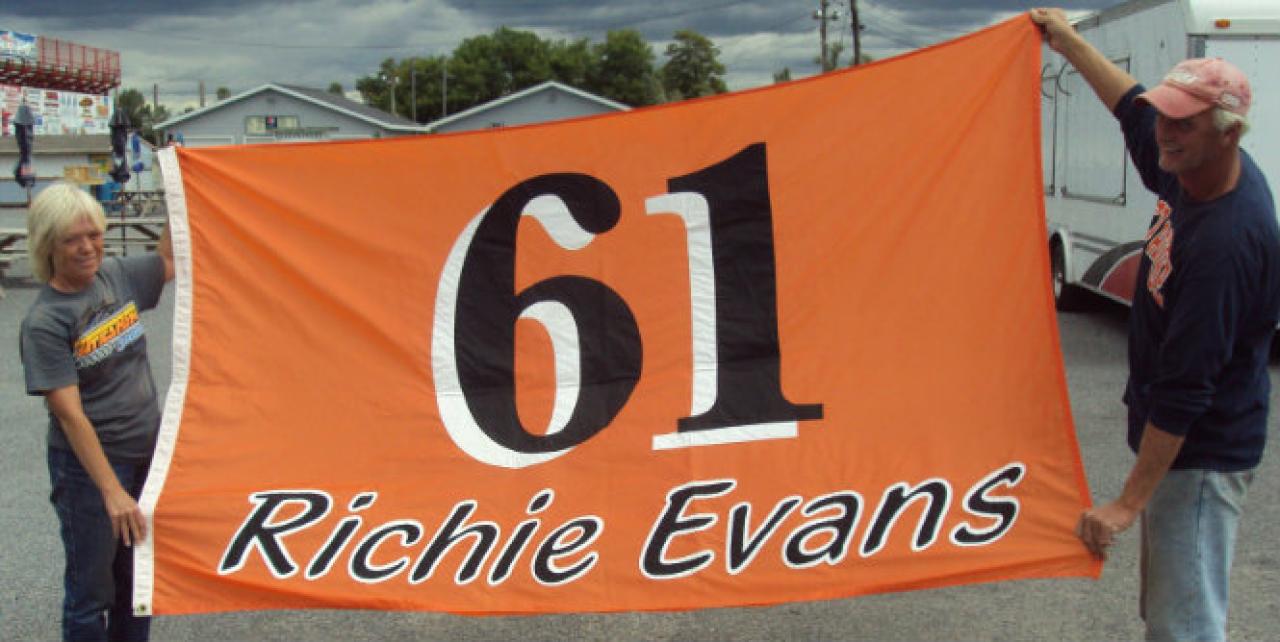Ralph and Dale
VERY LONG WRITE UP IN DESCRIPTION BUT GOOD

ROME, N.Y. -- Chunks of stucco are missing near the roof line, and the weather-beaten garage bay door has clearly seen better days, but the white building on Calvert Street has always been less about outward appearance than the product crafted within. Late on a weekday afternoon, tools clang and welding torches flash as men mold iron bars and metal sheeting into vehicles built for speed. In the center of the shop floor is a reconditioned modified race car, its sleek and menacing front end receiving a fresh coat of polish. The colors are familiar shades of orange and black, and a small, commemorative number under the window opening is the same as the address above the front door.
61.
It's owned by someone else now, and still functions as an active race shop, but to the people in this city an hour east of Syracuse, it will always be Richie Evans' garage. The cars that won nine NASCAR modified championships, claimed nearly 500 feature victories, and launched the career of the first Hall of Fame driver from outside the sport's premier series were spawned from a building where a few of Evans' personal effects -- some pairs of shoes, newspaper clippings, reputedly a bowling ball -- are still stashed in the attic. Above one doorway are dozens of small holes, where the corks from Victory Lane champagne bottles were tacked up after a win. One wall used to hold the payphone that was rigged to give Evans his money back after each call. Back in what's now the parts room, there was once a fridge always stacked with Pabst Blue Ribbon.
“
He was comfortable ... He would have never left [for Cup]. He would have never left Rome. He didn't need to."
”
-- JODI EVANS MEOLA
His old office may now be a storage area for race tires, and gone are the days when Evans once used the spent oil from his race cars to heat the shop in the wintertime, but his presence still inhabits this place, as if he had just stopped by yesterday. That's the way it is everywhere in Rome, where Evans' favorite bar still stands, where his car number is ubiquitous, where locals will tell you about the times Evans would take his modified out on Erie Boulevard for a test run, and the cops would only shake their heads. He died 26 years ago in a crash while practicing for an event at Martinsville Speedway, but the Richie Evans legacy is alive and well in a hometown where he was so beloved, and so comfortable, not even the lure of NASCAR's Cup Series could coax him away.
"I don't think he would have ever left Rome, to be honest. You may get different answers from other family members, but I don't think he would have ever left Rome," said Jodi Evans Meola, the oldest of Evans' six children. "He was comfortable. His garage was in Rome, and everybody in Rome knew who he was, and I think everyone in Rome admired him as a good guy. He would have never left. He would have never left Rome. He didn't need to."
He certainly had his opportunities, never more so than the day in 1979 when Gene DeWitt, owner of the road construction company that backed Evans' race cars, arrived at the Calvert Street shop in a limousine. Evans was at the peak of his career, and DeWitt was interested in bringing his operation to NASCAR's premier series. But Evans wasn't interested in going along, remembered Art Newman, a friend who was working on the windows of the garage bay door when DeWitt pulled up. The reasons why all seemed to revolve around the levels of success, security and contentment Evans had reached in his hometown.
"When he was at the garage, and when he was in Rome, he always said to me: 'After I go up that hill ... and go down, I'm Richie Evans the race car driver. When I come home, and I come back over that hill, I'm Richie Evans,' " recalled Newman, who is such an admirer of Evans that he has incorporated 61 into both his telephone number and car license plate. "Not the race car driver, just Richie Evans. When he went over that bridge, he knew it was a different life."
At short tracks aro